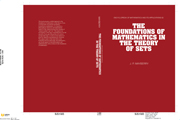Book contents
- Frontmatter
- Contents
- Preface
- Part One Preliminaries
- Part Two Basic Set Theory
- Part Three Cantorian Set Theory
- Part Four Euclidean Set Theory
- 8 Euclidean Finitism
- 9 The Euclidean Theory of Cardinality
- 10 The Euclidean Theory of Simply Infinite Systems
- 11 Euclidean Set Theory from the Cantorian Standpoint
- 12 Envoi
- Appendix 1 Conceptual Notation
- Appendix 2 The Rank of a Set
- Bibliography
- Index
12 - Envoi
from Part Four - Euclidean Set Theory
Published online by Cambridge University Press: 05 March 2012
- Frontmatter
- Contents
- Preface
- Part One Preliminaries
- Part Two Basic Set Theory
- Part Three Cantorian Set Theory
- Part Four Euclidean Set Theory
- 8 Euclidean Finitism
- 9 The Euclidean Theory of Cardinality
- 10 The Euclidean Theory of Simply Infinite Systems
- 11 Euclidean Set Theory from the Cantorian Standpoint
- 12 Envoi
- Appendix 1 Conceptual Notation
- Appendix 2 The Rank of a Set
- Bibliography
- Index
Summary
Euclid or Cantor?
The choice between the Cantorian and the Euclidean versions of set theory turns on the meaning of finite: does the cardinality of a set increase when we add new elements to it?
We all know the consequences of adopting Cantor's version of finiteness: we get mathematics as it has been practised for the past one hundred years. To opt for the traditional Euclidean answer would seem to be, at least on the face of it, to give up all of the marvellous developments of twentieth century mathematics – not something to be done lightly. Moreover, as I have argued in Part 3, Cantor's radical innovation, though it appears at first to be unjustified, leads not just to a perfectly coherent account of the current practice of mathematics, but to a convincing justification of that practice.
For the axioms of set theory, when they are interpreted as principles characterising the notion of a finite plurality or multitude, all, with the single exception of Cantor's Axiom, possess that character of self-evidence that has traditionally been required of axioms. So if you accept that single novel idea, if, like Cantor, you take it as obvious that the species of natural numbers is definite in size, then you get the whole of modern mathematics, and, moreover, the whole of modern mathematics resting on self-evident truths about clear and logically simple basic concepts.
- Type
- Chapter
- Information
- The Foundations of Mathematics in the Theory of Sets , pp. 381 - 395Publisher: Cambridge University PressPrint publication year: 2001

